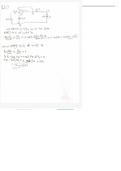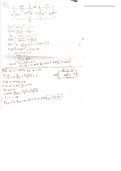Rlc circuit - Study guides, Class notes & Summaries
Looking for the best study guides, study notes and summaries about Rlc circuit? On this page you'll find 53 study documents about Rlc circuit.
Page 4 out of 53 results
Sort by

-
Network analysis HW Chapter 5
- Other • 20 pages • 2023
-
 EduCore
EduCore
-
- $10.49
- + learn more
This course will cover the topics in electric network analysis and design. Techniques of electric circuit theory are studied and applied in network analysis and design, operational amplifiers, and related circuits, including the applications with NI Multisim, and MATLAB software packages. Analysis of circuits with dependent sources, basic waveforms, RL, RC, and RLC circuit transients and sinusoidal response, network functions, and power analysis

-
Circuit Elements and Laws Chapter 1
- Other • 82 pages • 2023
-
 EduCore
EduCore
-
- $9.59
- + learn more
This course will cover the topics in electric network analysis and design. Techniques of electric circuit theory are studied and applied in network analysis and design, operational amplifiers, and related circuits, including the applications with NI Multisim, and MATLAB software packages. Analysis of circuits with dependent sources, basic waveforms, RL, RC, and RLC circuit transients and sinusoidal response, network functions, and power analysis

-
Operational Amplifier chapter 6
- Other • 76 pages • 2023
-
 EduCore
EduCore
-
- $9.59
- + learn more
This course will cover the topics in electric network analysis and design. Techniques of electric circuit theory are studied and applied in network analysis and design, operational amplifiers, and related circuits, including the applications with NI Multisim, and MATLAB software packages. Analysis of circuits with dependent sources, basic waveforms, RL, RC, and RLC circuit transients and sinusoidal response, network functions, and power analysis

-
Resistive Circuits Chapter 3 and 4
- Other • 76 pages • 2023
-
 EduCore
EduCore
-
- $9.59
- + learn more
This course will cover the topics in electric network analysis and design. Techniques of electric circuit theory are studied and applied in network analysis and design, operational amplifiers, and related circuits, including the applications with NI Multisim, and MATLAB software packages. Analysis of circuits with dependent sources, basic waveforms, RL, RC, and RLC circuit transients and sinusoidal response, network functions, and power analysis

-
Electrical sources And switches chapter 2
- Other • 33 pages • 2023
-
 EduCore
EduCore
-
- $9.59
- + learn more
This course will cover the topics in electric network analysis and design. Techniques of electric circuit theory are studied and applied in network analysis and design, operational amplifiers, and related circuits, including the applications with NI Multisim, and MATLAB software packages. Analysis of circuits with dependent sources, basic waveforms, RL, RC, and RLC circuit transients and sinusoidal response, network functions, and power analysis .

-
Methods of Analysis of Resistive Circuit Chapter 5a
- Other • 47 pages • 2023
-
 EduCore
EduCore
-
- $9.59
- + learn more
This course will cover the topics in electric network analysis and design. Techniques of electric circuit theory are studied and applied in network analysis and design, operational amplifiers, and related circuits, including the applications with NI Multisim, and MATLAB software packages. Analysis of circuits with dependent sources, basic waveforms, RL, RC, and RLC circuit transients and sinusoidal response, network functions, and power analysis

-
Circuit Theorems Chapter 5
- Other • 103 pages • 2023
-
 EduCore
EduCore
-
- $9.59
- + learn more
This course will cover the topics in electric network analysis and design. Techniques of electric circuit theory are studied and applied in network analysis and design, operational amplifiers, and related circuits, including the applications with NI Multisim, and MATLAB software packages. Analysis of circuits with dependent sources, basic waveforms, RL, RC, and RLC circuit transients and sinusoidal response, network functions, and power analysis

-
Resistive Circuits chapter 3
- Other • 45 pages • 2023
-
 EduCore
EduCore
-
- $9.59
- + learn more
This course will cover the topics in electric network analysis and design. Techniques of electric circuit theory are studied and applied in network analysis and design, operational amplifiers, and related circuits, including the applications with NI Multisim, and MATLAB software packages. Analysis of circuits with dependent sources, basic waveforms, RL, RC, and RLC circuit transients and sinusoidal response, network functions, and power analysis

-
Network Analysis Homework 1
- Other • 14 pages • 2023
-
 EduCore
EduCore
-
- $10.49
- + learn more
This course will cover the topics in electric network analysis and design. Techniques of electric circuit theory are studied and applied in network analysis and design, operational amplifiers, and related circuits, including the applications with NI Multisim, and MATLAB software packages. Analysis of circuits with dependent sources, basic waveforms, RL, RC, and RLC circuit transients and sinusoidal response, network functions, and power analysis

-
Network analysis HW Chapter 4
- Other • 10 pages • 2023
-
 EduCore
EduCore
-
- $10.49
- + learn more
This course will cover the topics in electric network analysis and design. Techniques of electric circuit theory are studied and applied in network analysis and design, operational amplifiers, and related circuits, including the applications with NI Multisim, and MATLAB software packages. Analysis of circuits with dependent sources, basic waveforms, RL, RC, and RLC circuit transients and sinusoidal response, network functions, and power analysis

Study stress? For sellers on Stuvia, these are actually golden times. KA-CHING! Earn from your study resources too and start uploading now. Discover all about earning on Stuvia


